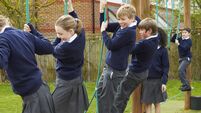Colman Noctor: How to raise a resilient child who can cope with adversity and failure

Picture: iStock
'Children have it too easy'; 'They need to experience disappointment and failure - it's part of life'; 'They have to learn that everything doesn't always go the way they want it to'.
These are just a sample of the phrases I hear regularly. Although there is some truth in each one, the answer to the 'lack of resilience' in children might not be quite as simple as these phrases claim.










